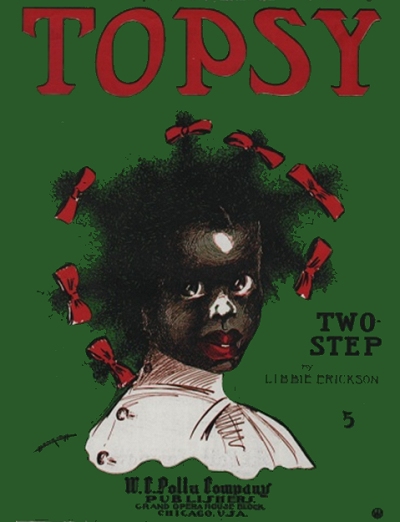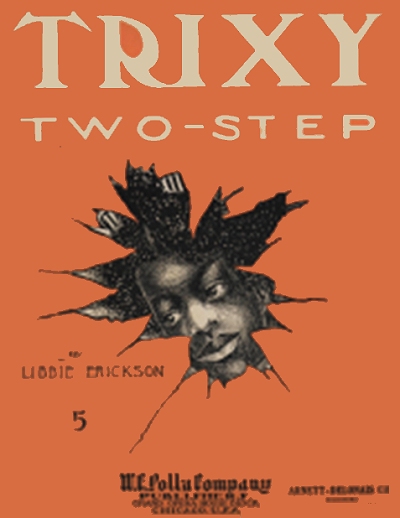Elizabeth Whitcher was born in Hokah, Minnesota to Henry Whitcher and Euretta Holmes. She had two younger siblings, including Clinton (5/8/1877-1880) who died in childhood, and Lulubell (2/22/1886). By the time of the 1880 census the family was living in Red Wing, Minnesota, with Henry engaged as a railroad yard master. For the 1885 state census the Whitchers were living across the border in Wisconsin. Nothing was found on Libbie's musical training, but she evidently got some of the rudimentary elements necessary to play and compose in the manner that she did. By the time of the 1895 Wisconsin census, Euretta was divorced and living in La Crosse with her two remaining children.
Nothing was found on Libbie's musical training, but she evidently got some of the rudimentary elements necessary to play and compose in the manner that she did. By the time of the 1895 Wisconsin census, Euretta was divorced and living in La Crosse with her two remaining children.
 Nothing was found on Libbie's musical training, but she evidently got some of the rudimentary elements necessary to play and compose in the manner that she did. By the time of the 1895 Wisconsin census, Euretta was divorced and living in La Crosse with her two remaining children.
Nothing was found on Libbie's musical training, but she evidently got some of the rudimentary elements necessary to play and compose in the manner that she did. By the time of the 1895 Wisconsin census, Euretta was divorced and living in La Crosse with her two remaining children.On December 18, 1895, Libbie was married to George Martin Erickson in La Crosse. Her mother and sister joined the Erickson household, as did two new children, Edith M. (9/1896) and Samuel Torrance (4/1899). At the time of the 1900 enumeration, George was shown as working as a stenographer but Libbie had no occupation listed. At some point in 1901 or 1902 George left Libbie, who had her mother and two young children to support. In order to survive she decided to call on her training and talent to establish a career in music.
Leaving her children with their maternal grandmother and uncle, Anna K. Erickson and Daniel N. Erickson, Libbie relocated to the thriving metropolis of Minneapolis, Minnesota, known for its beer and flour mills on the Mississippi River. In the 1902 directory she was listed as a musician working for the William Donaldson Company, better known as Donaldsons of Minneapolis, one of the first department stores in the city. The following year Libbie was working for The Leader department store, part of the Powers and Hutchinson Company, where she acquired her most fame. She worked variously at the Leader and Powers stores from late 1902 through around 1906. This was also the period when all of her known compositions were published.
The first two, Trixy and Topsy, both published by William Polla in Chicago, might be considered sibling pieces, not just musically, but for their H.C. Henrich illustrated cover images as well. They are fine piano rags, and Libbie likely delighted many browsers at the music department of the stores she worked in playing these and other syncopated hits of the day. Skip, more of a bouncy intermezzo than a rag, was published in 1906 by Arnett DeLonais in Chicago. She had obviously visited the city a couple of times, but it is unknown if she performed there. Her Palmah House Shuffle was most likely inspired by the Palmer House of Chicago (although they had other hotels located in the Midwest). Sunshine Tyrolean was a waltz that, along with Skip, was distributed in band and orchestral arrangements, so was played throughout the country for several years.
Sunshine Tyrolean was a waltz that, along with Skip, was distributed in band and orchestral arrangements, so was played throughout the country for several years.
 Sunshine Tyrolean was a waltz that, along with Skip, was distributed in band and orchestral arrangements, so was played throughout the country for several years.
Sunshine Tyrolean was a waltz that, along with Skip, was distributed in band and orchestral arrangements, so was played throughout the country for several years.Libbie appears to have left Minneapolis around 1907 to try her luck elsewhere. An advertisement of the Oshkosh Daily Northwestern of May 22, 1907, for a short-lived vaudeville theater touted:
Libbie Erickson at Happyland
Libbie Erickson, the composer of "Sunshine," "Skip," and numerous other popular musical compositions, has won national and world wide fame as a maker of real popular music. The manager of Happyland has secured this composer and pianist at a great expense and hereby wishes to announce that Libbie Erickson will render one or more of her selections during each performance at Happyland.
Miss Erickson has consented to play her compositions at Wilson's Music Store at 2 to 3 o'clock daily, for the next few days. Change of program Sundays, Tuesdays and Fridays. Matinees every day at 3 p.m., Evening at 7:15.
Her next move was a bit surprising. Again, leaving her children in Wisconsin with the Ericksons, Libbie and Euretta relocated to Tacoma, Washington. They were found there for the 1910 census with Libbie listed as a piano musician and Euretta working as a private nurse. Her musical career in the west did not work out well, and by 1911 Libbie was working as a clerk at the Arcade Store, the nature of which is uncertain. Her last listing there was in 1914.
From this point on little was found on Mrs. Erickson. Euretta married John Brown, 74 to her 58, in March 1913. Libbie moved down to Portland, Oregon, by 1920, working as a clerk in a millinery shop according to the census taken that January. Her daughter Edith had moved in with Euretta and John, and was working as a schoolteacher in the Tacoma area in 1920. Libbie appears to have stayed in Portland for the rest of her life. On a visit to Salt Lake City, Utah, in the fall of 1938, Libbie became ill and was hospitalized. She died at age 63 of a stroke brought on by high blood pressure.
 Known Compositions
Known Compositions